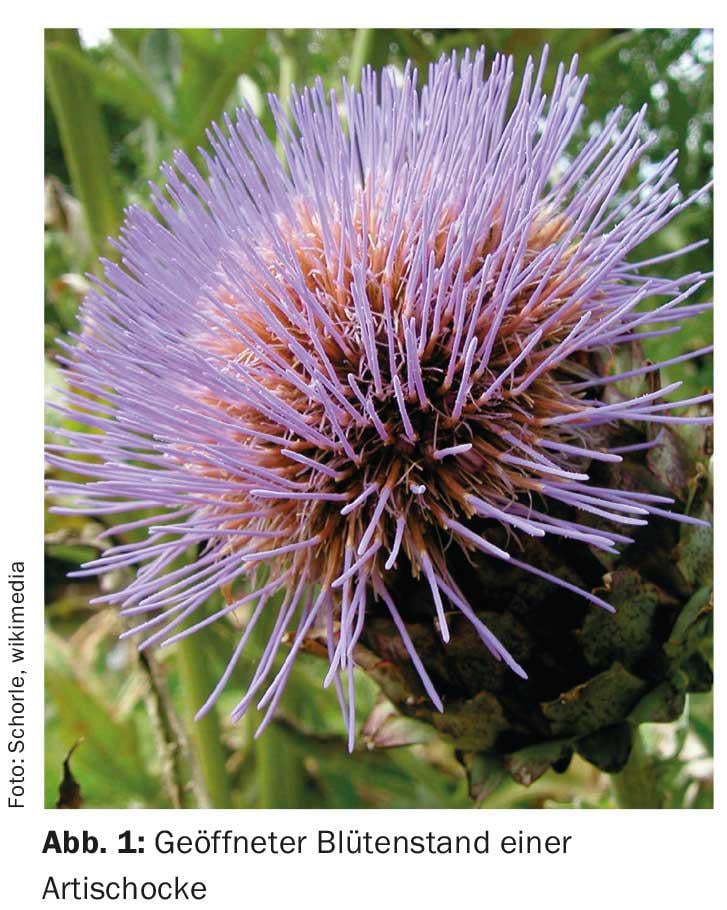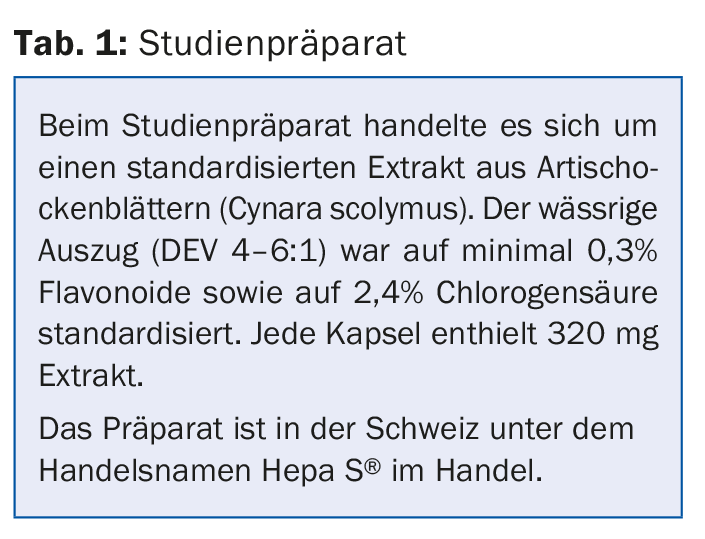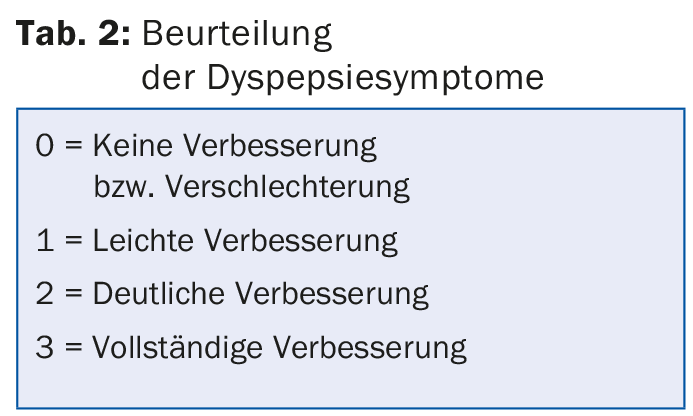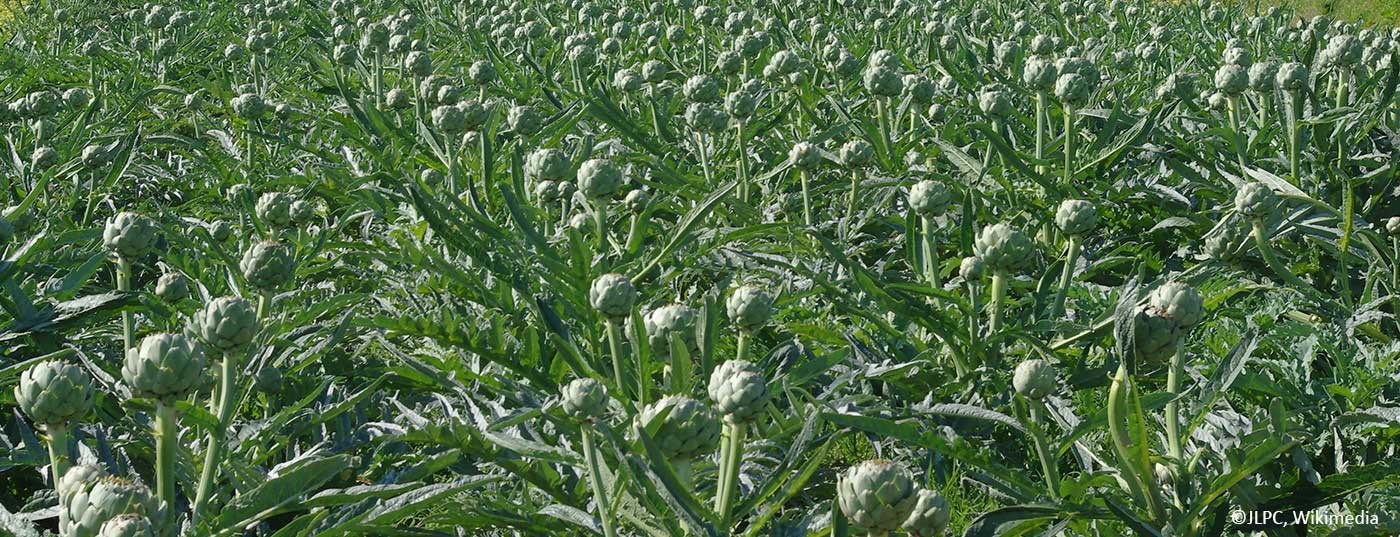Artichoke is a medicinal plant known since ancient times and is cultivated as a vegetable. There are studies documenting its effectiveness in dyspeptic complaints and in lowering cholesterol levels.
The artichoke, Cynara scolymus, of the composite family (Asteraceae, Fig. 1) is a herbaceous plant whose inflorescences are edible as vegetables. Cultivated varieties have a larger inflorescence than wild. The flower bases are also edible. Very famous is the appetizing drink Cynar, which is made primarily from artichoke extract.

Artichoke as a medicinal plant
However, the artichoke is known not only as a vegetable, but also in medicine as a medicinal plant. The main applications of extracts obtained from leaves concern digestion and cholesterol. Representations from ancient times show that the artichoke was already used in Egypt, Greece and the Roman Empire against digestive problems [1].
The main constituents of Cynara scolymus are phenolic acids such as chlorogenic acid, cynarin and caffeic acid. Sesquiterpene lactones and flavonoids are also found. Clinical studies documenting the efficacy of artichoke are presented below.
Artichoke for dyspepsia
Marakis W, et al. 2002: A team of researchers led by W. Marakis published a randomized open-label trial in 2002 that included 516 patients [2]. According to the patients, they suffered from dyspepsia and anxiety caused by it. 454 subjects took the study drug until the end of the study, i.e. during eight weeks either at the dose 320 mg/d (n=231) or 640 mg/d (n=223) (Table 1). The primary endpoint was the degree of dyspepsia at baseline and at the end of the study using the Nepean Dyspepsia Index (NDI), and the secondary endpoint was anxiety using the Spielberger State-Trait Anxiety Inventory (STAI).

Both groups of subjects had similar values in NDI at baseline: 56.3 (320 mg) and 57.3 (640 mg). At the end of the treatment period, there was a significant improvement in NDI (p<0.01), with no difference in efficacy between the two groups. Both arms also showed a significant improvement in anxiety compared with baseline after the eight-week treatment. The 640 mg/d group showed significantly greater improvement over the other.
Holtman G, et al. 2003: One year later, another study was published in which the efficacy of the same preparation was tested in patients with functional dyspepsia [3]. This study was designed as a placebo-controlled, randomized, double-blind, multicenter trial (RCT). Patients took either 3× 1 capsule/d of the study drug or placebo. The primary outcome variable was change in dyspepsia symptoms, assessed with a 4-point scale (Table 2) . The secondary outcome variable was the NDI. Of the 247 subjects recruited, 244 were included in the analysis.

In the verum group, dyspepsia symptoms improved significantly compared to placebo (verum: 8.3 points; placebo: 6.7; p=0.00069). The number of patients reporting complete remission of symptoms was significantly higher overall in the verum arm. For the questions of the NDI that concerned quality of life, a significantly greater improvement was observed in the verum group than in the placebo group (-41.1 vs. -24.8; p<0.01).
Cholesterol reduction
Rondanelli M, et al. 2013: In a randomized, double-blind, placebo-controlled trial, Rondanelli and colleagues investigated the effect of an artichoke leaf extract (2× 250 mg/d) on cholesterol levels in 92 overweight subjects [4]. After eight weeks of therapy, the verum group showed a significant improvement in HDL levels (p<0.001), LDL levels (p<0.001), and total cholesterol (p=0.033) compared to placebo. Artichoke leaf extracts may play a relevant role in the treatment of mild hypercholesterolemia, the authors concluded.
Cochrane Review 2013: In 2013, the renowned Cochrane Collaboration tested the cholesterol-lowering potential of artichoke in a meta-analysis [5]. In it, the authors conclude, “There is evidence that artichoke leaf extracts have potential to reduce cholesterol levels, but the evidence is not convincing so far.” Considering how rigorously the Cochrane Collaboration normally evaluates herbal therapy, such a verdict can almost be interpreted positively. The analysis evaluated three RCTs that included a total of 262 subjects. All three studies showed a significant reduction in cholesterol levels (p=0.025; p=0.00001; p<0.05). The first two studies lasted twelve weeks and 42 ± 3 days, respectively. No study duration was reported for the third study. The review deals exclusively with the cholesterol-lowering potential of Cynara scolymus, but not with its efficacy in dyspeptic complaints.
Summary
The artichoke is not only a vegetable, but has also been used since ancient times to treat digestive problems. Dyspeptic complaints are in the foreground. With various clinical studies, it has been demonstrated that standardized artichoke extracts can significantly improve symptoms of dyspeptic symptoms. For certain symptoms, a daily dose of 640 mg appears to be more effective than 320 mg.
The reduction of cholesterol levels has also been clinically documented. A 2013 Cochrane Review attributed cholesterol-lowering potential to artichoke leaf extracts.
Thus, standardized extracts from the leaves of Cynara scolymus prove to be an effective alternative to conventional preparations for dyspeptic complaints as well as for lowering mild hypercholesterolemia.
Literature:
- Omara N: Cynara SL (Cynara Scolymus). Pharm Lett 2000; 16: 1607-1609.
- Marakis W, et al: Artichoke leaf extract reduces mild dyspepsia in an open study. Phytomedicine 2002; 9: 694-699.
- Holtman G, et al: Efficacy of artichoke leaf extract in the treatment of patients with functional dyspepsia: a six-week placebo-controlled, double-blind, multicentre trial. Aliment Pharmacol Ther 2003; 18: 1099-1105.
- Rondanelli M, et al: Beneficial effects of artichoke leaf extract supplementation on increasing HDL-cholesterol in subjects with primary mild hypercholesterolaemia: a double-blind, randomized, placebo-controlled trial. Int J Food Sci Nutr 2013; 64(1): 7-15.
- Wider B, et al: Artichoke leaf extract for treating hypercholsterolaemia. Cochrane Database Syst Rev 2013 Mar 28; 3: CD003335.
GP PRACTICE 2016: 11(4): 2-3











